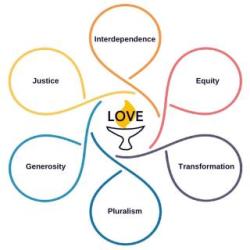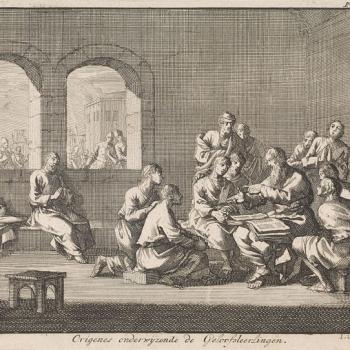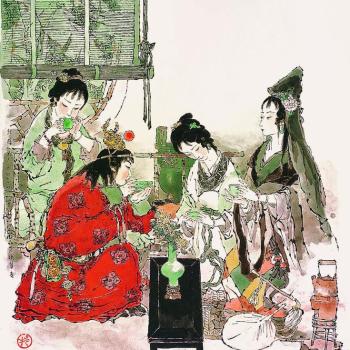Rabindranath Tagore was born on this day the 6th of May,1861. He was a Bengali poet, a musicians, and an artist.
Tagore was the first non-European to win the Nobel Prize for literature, in 1913.
His Wikipedia article noted how he was a “humanist, universalist, internationalist, and ardent anti-nationalist.” He was also active in the Indian liberation movement seeking to throw off the yoke of English imperialism.
Of particular interest to me is how following his father, a leader of the Brahmo Samaj, a Hindu-reform movement inspired in part by both English and American Unitarianism. It is a movement which, I suggest has over the many years returned the favor. (For some small examples look here and here and here) birthing what I often speak of as a New Universalism.
An unsigned article about Tagore at the Harvard Square Library attempts to summarize this new universalism’s core theological assertion.
“Tagore’s parables and prayers express a philosophy of polarity whose God is temporal-eternal, actual-potential, Becoming-Being. He dramatizes and personalizes the modern scientific worldview of panentheism (not pantheism) independently developed by Whitehead and the contemporary American Unitarian Universalist philosopher, Charles Hartshorne. Rabindranath Tagore has contributed to humanity a legacy of prayers which express an intimacy characteristic of the Psalms of the Old Testament, but they avoid the latter’s recurrent vindictiveness. His I-Thou experience is as vivid as that communicated in the Confessions of Augustine, but it avoids the latter’s debilitating otherworldliness.”
I could argue with several points. But that’s part of the compelling quality of this universalism of which Tagore is a central figure: it cannot be captured by a single voice, a single treatise, a single song. There are endless facets to this jewel.
And. Of all the world religions it can be argued it is Hinduism, or, at least threads of Hinduism that have most inspired this shift in American liberal religion’s understanding of universalism. Tagore would be closely associated with this spiritual movement for the whole of his life. And, so, I’m grateful for the poet and the mystic, Rabindranath Tagore.
From the Gitanjali
On the day when the lotus bloomed, alas, my mind was straying,
and I knew it not. My basket was empty and the flower remained
unheeded.
Only now and again a sadness fell upon me, and I started up from
my dream and felt a sweet trace of a strange fragrance in the
south wind.
That vague sweetness made my heart ache with longing and it
seemed to me that is was the eager breath of the summer seeking
for its completion.
I knew not then that it was so near, that it was mine, and that
this perfect sweetness had blossomed in the depth of my own
heart.
I must launch out my boat. The languid hours pass by on the
shore–Alas for me!
The spring has done its flowering and taken leave. And now with
the burden of faded futile flowers I wait and linger.
The waves have become clamorous, and upon the bank in the shady
lane the yellow leaves flutter and fall.
What emptiness do you gaze upon! Do you not feel a thrill
passing through the air with the notes of the far-away song
floating from the other shore?













